How Long Do RV Water Softeners Last (2024)

Shop Our Products
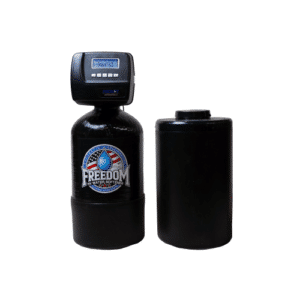
Freedom RV Water Softener System
Specifically for RV and fifth-wheel owners, this high-quality system guarantees your RV’s water is pure,
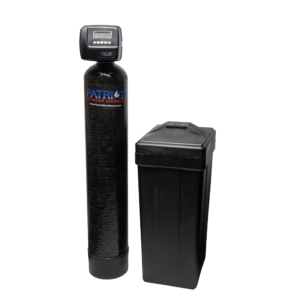
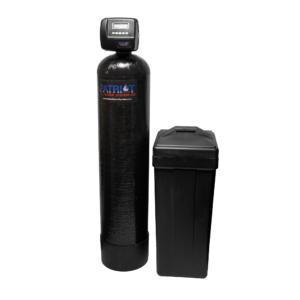
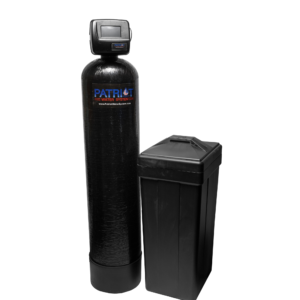
If you’re hitting the road in your RV, one thing you don’t want to worry about is hard water wreaking havoc on your pipes and appliances. That’s where a good RV water softener comes into play. But just how long do these handy devices last? Let’s dive into everything you need to know about the lifespan of RV water softeners, along with some tips to keep them running smoothly.
What Affects the Lifespan of an RV Water Softener?
Several factors influence how long your RV water softener will last:
- Quality of the Softener: Higher-quality systems tend to have a longer system lifespan. Investing in a reputable brand can make a big difference.
- Frequency of Use: If you’re a full-time RVer, your water softener will get more use than if you only travel occasionally. More usage can lead to more wear and tear.
- Maintenance: Regular maintenance is crucial. Proper care will significantly extend the life of your water softener; things like regenerating your softener routinely is one of the things you can do.
- Water Hardness Levels: The harder the water, the more your softener has to work, which can affect its longevity.
For more insights on what hard water is and how it affects your water softener, check out our detailed post on what is hard water.
Typical Lifespan of an RV Water Softener
On average, an RV water softener can last anywhere from 7 to 10 years. This range varies widely based on the factors mentioned above. With proper care and maintenance, you can expect your water softener to be closer to the upper end of this range.
Essential Maintenance Tips
Keeping your RV water softener in top shape involves regular maintenance. Here are some essential tips:
- Regular Regeneration: Follow the manufacturer’s guidelines on how often to regenerate your softener. This process helps flush out the accumulated minerals.
- Check Salt Levels: Ensure that the brine tank has enough salt. Without sufficient salt, the softener can’t effectively remove minerals from the water.
- Clean the Tank: Occasionally, clean the brine tank to prevent buildup. A dirty tank can hinder the system’s performance.
- Inspect for Leaks: Regularly check for any leaks or damages in the system. Early detection can prevent more severe issues.
For a comprehensive guide on maintaining your water softener, visit our water softener maintenance guide.
Signs That Your RV Water Softener Needs Replacement
No matter how well you maintain your water softener, it will eventually need to be replaced. Here are some signs that it might be time for a new one:
- Reduced Efficiency: If you notice that your water isn’t as soft as it used to be, even after regeneration, it might be time for a replacement.
- Frequent Repairs: Constantly fixing issues can be a sign that your system is nearing the end of its life.
- Physical Damage: Cracks or other physical damages to the tank or components often mean it’s time for a new unit.
Choosing the Right Water Softener for Your RV
When it’s time to replace your water softener, choosing the right one can make all the difference. Here are some factors to consider:
- Size and Capacity: Make sure the unit fits your RV and can handle your water usage needs.
- Ease of Installation: Some systems are more user-friendly and easier to install than others.
- Maintenance Requirements: Consider how easy it is to maintain the unit.
You can also check out our 2024 list of the Best RV Water Softeners for a detailed comparison of the industrying top products.
Conclusion
An RV water softener is a great tool for ensuring you have soft water on the road, protecting your pipes important to note that while these tips are generally applicable, individual circumstances may vary. Always consult your manufacturer’s guidelines and consider your specific RV usage when maintaining your water softener.
Got any questions about RV water softeners? Feel free to reach out to us here. We’re here to help you make the most of your RV water softener. Happy RVing!
Frequently Asked Questions
How long does an RV water softener typically last?
An RV water softener usually lasts between 5 to 15 years, depending on factors such as quality, frequency of use, maintenance, and water hardness levels.
What can I do to extend the lifespan of my RV water softener?
Regular maintenance is key. This includes regenerating the softener as recommended by the manufacturer, checking and refilling salt levels, cleaning the brine tank, and inspecting for leaks or damages.
How do I know when my RV water softener needs to be replaced?
Signs that your water softener might need replacing include reduced efficiency in softening water, frequent repairs, and physical damage to the tank or components.
What affects the lifespan of an RV water softener?
Factors include the quality of the softener, how often it’s used, the level of maintenance it receives, and the hardness of the water it’s treating.
What size RV water softener should I get?
The size depends on your water usage and the size of your RV. Smaller units are typically sufficient for occasional use, while full-time RVers might need a larger capacity softener.
Share:
Talk to A Water Quality Expert
Shop Our Products

Freedom RV Water Softener System
Specifically for RV and fifth-wheel owners, this high-quality system guarantees your RV’s water is pure,



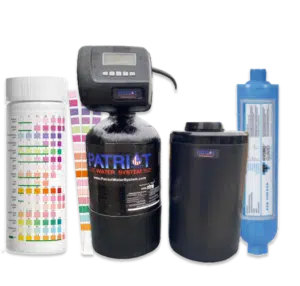
The Best Self Regenerating RV Water Softener
Patriot’s Freedom Water System is the best self regenerating RV water softener on the market. It features automatic regeneration, a compact design, and requires minimal maintenance, making sure you have a steady supply of soft, clean water in your RV.

How To Maintain Your RV Water Softener
Taking care of your RV water softener keeps your plumbing safe and your appliances running smoothly. This guide covers how to handle both self regenerating and manual units, troubleshoot common issues, and some helpful tips to keep maintenance easy.

6 Tips on How to Choose A Water Softener
To choose the right water softener, consider your household size, water usage, water hardness, regeneration method, salt-based vs. salt-free systems, installation, and maintenance needs.
Join Our
Newsletter
Get the latest information, and exclusive offers on water softening and purity solutions
